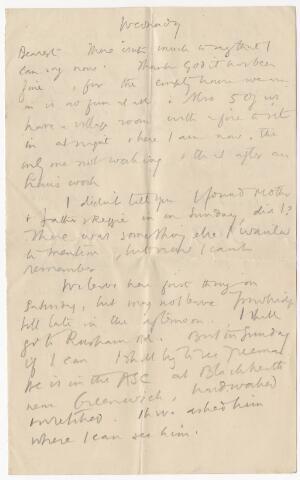Ardal dynodi
Cod cyfeirnod
Teitl
Dyddiad(au)
- 1916, Nov. 16 / (Creation)
Lefel y disgrifiad
Ffeil
Maint a chyfrwng
Ardal cyd-destun
Enw'r crëwr
Hanes bywgraffyddol
Edward Thomas (1878-1917), poet and writer, was born Philip Edward Thomas in Lambeth to Welsh-born parents on 3 March 1878. He was educated at St Paul's School, London and Lincoln College, Oxford. Having left St Paul's, Thomas studied for the civil service examination, a move which expressed parental ambition rather than his own as he had reacted against the wordly views of his father, who worked for the Board of Trade and was prominent in Liberal politics. He was encouraged in his early literary ambitions by the critic James Ashcroft Noble and Thomas's first book, The Woodland Life, inspired by his love of the natural world, appeared as early as 1897. Thomas married Noble's daughter Helen (1877-1967) in 1899 and, having graduated from Lincoln College in 1900, made a precarious living as a literary reviewer for the Daily Chronicle whilst also writing essays, anthologies, guidebooks and folk-tales. He also published further books, including The Heart of England (1906), as well as biographical writings, most notably those on Richard Jefferies (1909), Maurice Maeterlinck (1911), Algernon Charles Swinburne (1912) and Walter Pater (1913). This period also produced his autobiographical works The Happy-Go-Lucky Morgans (1913), The Icknield Way (1913) and In Pursuit of Spring (1914). Possibly from an overwhelming feeling that his creativity was shackled and frustrated, Thomas at this time suffered recurrent physical and psychological breakdowns which once took him to the brink of suicide. It was not until 1914 that he wrote his first 'real' poem, entitled 'Up in the Wind'. The wartime collapse of the literary market at last afforded Thomas more time to write poetry; over a space of two years, he was to write over one hundred and forty poems. In 1915 Thomas joined the Artists' Rifles; he was commissioned second lieutenant in 1916 and volunteered for service overseas. In April 1917 he was killed during the first hour of the battle of Arras in northern France and buried the following day on the outskirts of the town; he therefore did not live to see the publication of his Poems (1917) (under his pseudonym Edward Eastaway), nor the subsequent Last Poems (1918) and Collected Poems (1920). His wife Helen wrote of their time together in As It Was (1926) and World Without End (1931). Thomas numbered amongst his poetical and literary influences Robert Frost, Thomas Hardy, W. B. Yeats, D. H. Lawrence, Walter de la Mare, and W. H. Davies.
Hanes archifol
Once owned by Helen Thomas.
Ffynhonnell
Ardal cynnwys a strwythur
Natur a chynnwys
Letter from Edward Thomas to Helen Thomas. In envelope postmarked Wanstrow, Somerset, 16 Nov 1916.
Gwerthuso, dinistrio ac amserlennu
Action: digitized. Action identifier: cymruww1. Date: 2013. Authorization: The Welsh experience of World War One, 1914-1918.
Croniadau
System o drefniant
Ardal amodau mynediad a defnydd
Amodau rheoli mynediad
Amodau rheoli atgynhyrchu
Iaith y deunydd
- Saesneg
Sgript o ddeunydd
Nodiadau iaith a sgript
English.
Cyflwr ac anghenion technegol
Cymhorthion chwilio
Ardal deunyddiau perthynol
Bodolaeth a lleoliad y gwreiddiol
Cardiff University.
Bodolaeth a lleoliad copïau
Digital version available https://viewer.library.wales/3671628 (January 2024)
Unedau o ddisgrifiad cysylltiedig
Ardal nodiadau
Nodiadau
Item from Edward Thomas Archive, 424.
Nodiadau
Preferred citation: 424/1/1/1/1/207.
Dynodwr(dynodwyr) eraill
Virtua system control number
Project identifier
Pwyntiau mynediad
Pwyntiau mynediad pwnc
Pwyntiau mynediad lleoedd
Pwyntiau mynediad Enw
Pwyntiau mynediad Genre
Ardal rheolaeth disgrifiad
Dynodwr disgrifiad
Dynodwr sefydliad
Rheolau a/neu confensiynau a ddefnyddiwyd
Statws
Lefel manylder disgrifiad
Dyddiadau creadigaeth adolygiad dilead
Iaith(ieithoedd)
- Saesneg
Sgript(iau)
Ffynonellau
Gwrthrych digidol metadata
Lledred
Hydred
Math o gyfrwng
Image
Mime-type
image/jpeg

